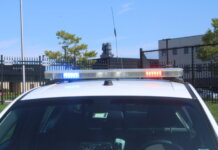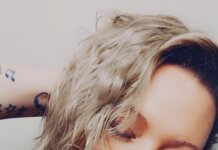WAVERLEY: The Fall River, Windsor Junction, Waverley, and Beaver Bank areas has seen a busy bear season to date, says an official with the Department of Lands and Forestry in Waverley.
Butch Galvez, Wildlife Technician, said reports of black bear sightings tend to peak in June, but by mid-July berries and other natural foods become more readily available and so complaints decrease. He said when it comes to bears it’s all about the foods.
Looking at posts at various community pages in Beaver Bank and the Fall River region, there have been a fair number of bear sighting reports.
“Fall River, Waverley, Windsor Junction and Beaver Bank have seen a fairly busy bear season so far,” said Galvez. “We have had dozens of calls on six or seven different bears (mostly sub-adults).
“Some are sightings of bears in their natural habitat, but most occurrences are of bears accessing green bins, garbage or bird feeders.
Galvez said if you see a bear in your green bin or bird feeder the best thing to do is make noise and try to discourage the bear.
“This can be done by beating pots and pans together and shouting sternly at the bear, using a panic alarm on your car or anything that will make a loud-sharp noise,” he said. “Never approach a bear, make noise from a safe vantage point (inside your home) and give the bear an escape route. Once the bear leaves identify the attractant and remove it.
“Bears learn where to find food in their home range. If we leave out easy meals, they will return – this can start the process of food conditioning and that’s what we want to avoid.
“In the absence of a food reward bears quickly learn to leave the immediate area.”
He was asked about people reporting bears and Lands and Forestry euthanizing them and not relocating. He said wildlife experts with the department work diligently to protect people and bears.
“We work with homeowners to address situations before they become problems or require drastic action,” said Galvez. “Euthanizing a bear is never our goal, it’s a last resort after all other options have been considered.
“Our initial approach when bear conflict arises is to educate residents and foster bear aware communities, we do so by posting signs and delivering brochures. We find in most cases simply removing a few bird feeders and improving green bin management is enough to keep bears wild and communities safe.”
Galvez said fortunately black bears show great restraint and attacks on humans are exceedingly rare, but again these are large powerful wild animals, so they deserve our respect.
“The Department of Lands and Forestry in the Halifax West District does ear-tag and relocate bears on occasion, however it’s important to note that relocation is always a last resort as it is stressful for the bear and doesn’t address the primary cause of conflict (attractants),” he said. “Relocation can work but we have to look at the history of the animal, age, sex, time of year, attractant removal compliance and natural food abundance.
“If done incorrectly, relocation can actually make the problem worse.”
He said during the past eight years the local Waverley office has received between 200-450 bear calls a year.
“In that time no bears have been euthanized or relocated.,” said Galvez. “Bear/human conflict isn’t about bears as much as it is our behaviours and actions.”
Galvez said many of the subdivisions in the area are built in excellent wildlife habitat, seeing a bear from time to time is totally normal.
“As our communities grow the land is increasingly fragmented and the number of attractants increases, it’s more important than ever to be bear aware,” he said.

































